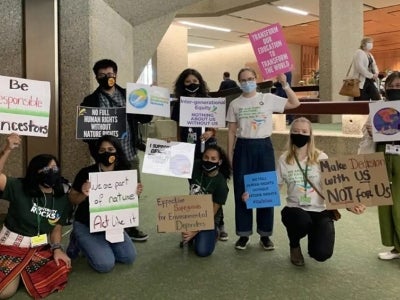How did a chemical supplier in Mozambique learn that its safety instructions were putting women and children in danger? How could female clam harvesters in Tunisia come together to create the first women’s trade union and go onto change national law? These are just two of eighteen inspiring stories shared by representatives from civil society organisations (CSO) about their experiences in successful systems change at the recent CSO Forum as part of the Global Environmental Facility (GEF) Sixth Assembly in Da Nang.
The theme of the GEF Assembly was the urgent need for transformational change to safeguard our planet. Over the course of the three-day Assembly, speakers regularly reminded participants that no single actor can trigger change and that we need to work together across sectors.
One of the leading voices for the important role of civil society was Olam’s CEO, Sunni Verghese. During the plenary session, Sunni reminded participants that “the private sector has to learn to trust civil society, and civil society has to learn to trust the private sector. [Each bring] complementary qualities. Only if both of us come together, can we make any meaningful change to happen.”
Learning directly from peers about the realities of systems change
We saw such learning in action at the interactive session of the CSO Forum at the GEF Assembly, which provided opportunities for peers to exchange directly on the realities of systems change. Eighteen storytellers gave a one-minute “pitch” summarising their experience before breaking out into small groups to share in more detail their stories of successful systems change. The main messages and themes were helpfully captured directly by other participants in the groups.
The stories that were shared illustrate many dimensions of successful change, including drivers of change, overcoming barriers and tipping points. Each story also demonstrated how civil society organisations can play different types of roles in successful systems change.
For example, CSOs can be pioneers, as reflected in the example from Carver Bacchus on “Edutainment” approaches to both entertain and educate the general public on environmental issues in Trinidad and Tobago. CSOs can also be enablers, such as in Ghana where Mary Jane Enchill brought together business, government and communities to increase engagement of CSOs and the private sector in the Ghanaian government’s GEF processes.
Or they can play a role of catalyst, as explained by Sana Taktak, who started by mobilizing women clam harvesters in her community. The movement spread not only to neighbouring villages but also culminated in the establishment of the first women’s trade union in Tunisia, leading to a supportive change in legislation and a signed convention with two companies in the seafood sector addressing women’s empowerment, biodiversity conservation, and socio-economic conditions. Indeed, the organised women were able to obtain prices for their clams that were four times higher than before.
Of the 18 stories shared, 10 involved the private sector in one way or another. Sometimes CSOs have taken a campaigning approach to provoke a behaviour change. In the story shared by Hala Murad, advocacy campaigns led by the local community helped to preserve one of the last forested lands in Jordan from a waste development. Other stories involved CSOs constructively engaging the private sector. Sana’s story of the women’s organized clam movement also demonstrated how CSOs can help to attract the private sector across a range of sustainability issues.
In another example from Mozambique, chemical supplier companies weren’t aware that by providing pesticides with safety information only written in English, women and children were especially exposing themselves to risk. The company worked with Thelma Munhequete and her colleagues at the Africa Foundation For Sustainable Development, relevant stakeholder and the Minister of Environment to ensure that chemicals were provided in the local language and that organic options were made available were feasible.
The brave and inspiring storytellers are now invited to capture their stories in more detail for others to be informed and inspired through the PANORAMA Solutions platform, where a new portal on business engagement for CSOs is being established as part of the IUCN’s BioBiz Exchange. (For an overview of all stories shared, see IISD’s report on the session.
Creating space to empower civil society to engage business
As Rosina Bierbaum, Chair of the GEF Scientific and Technical Advisory Panel said, “we can’t scale up change if we don’t accelerate the learning on what works and what doesn’t.” The BioBiz Exchange is IUCN’s contribution to accelerating the learning on public-private-community partnerships by offering training, easily accessible resources and space for peer-to-peer learning.
Underlying the theory of change of IUCN’s BioBiz Exchange is the belief that facilitating learning and exchange between CSOs can accelerate much needed transformation in environmental systems change at all levels, as demonstrated so effectively by the CSO storytellers and participants at the GEF Assembly.


